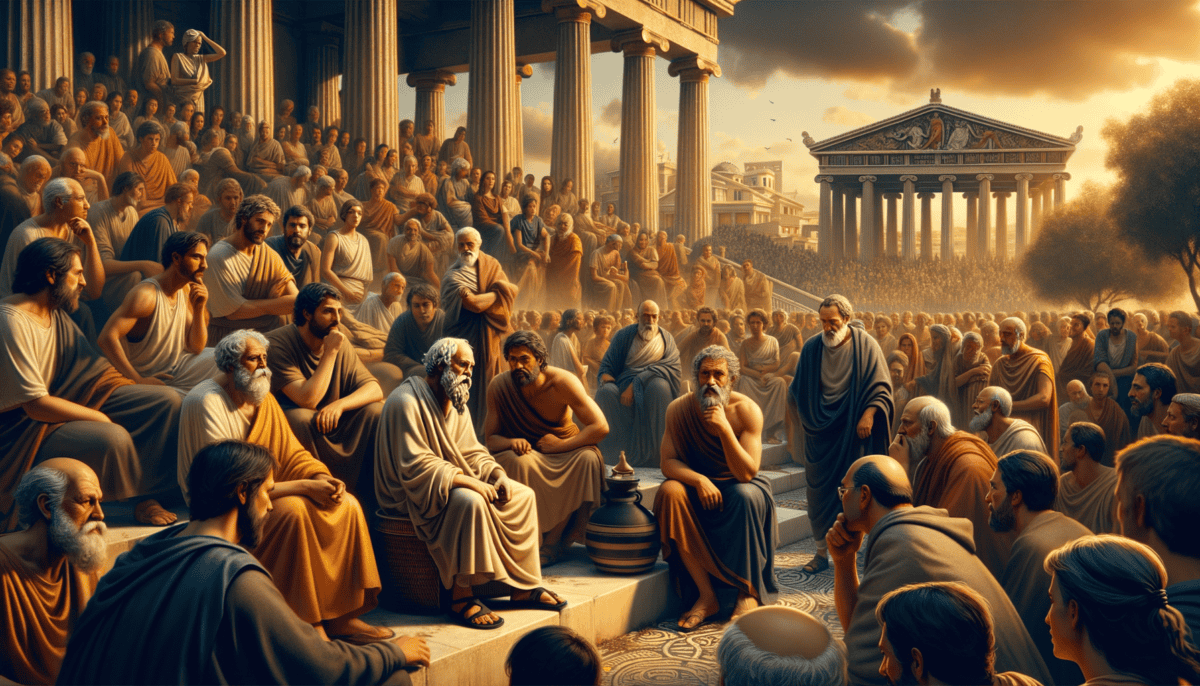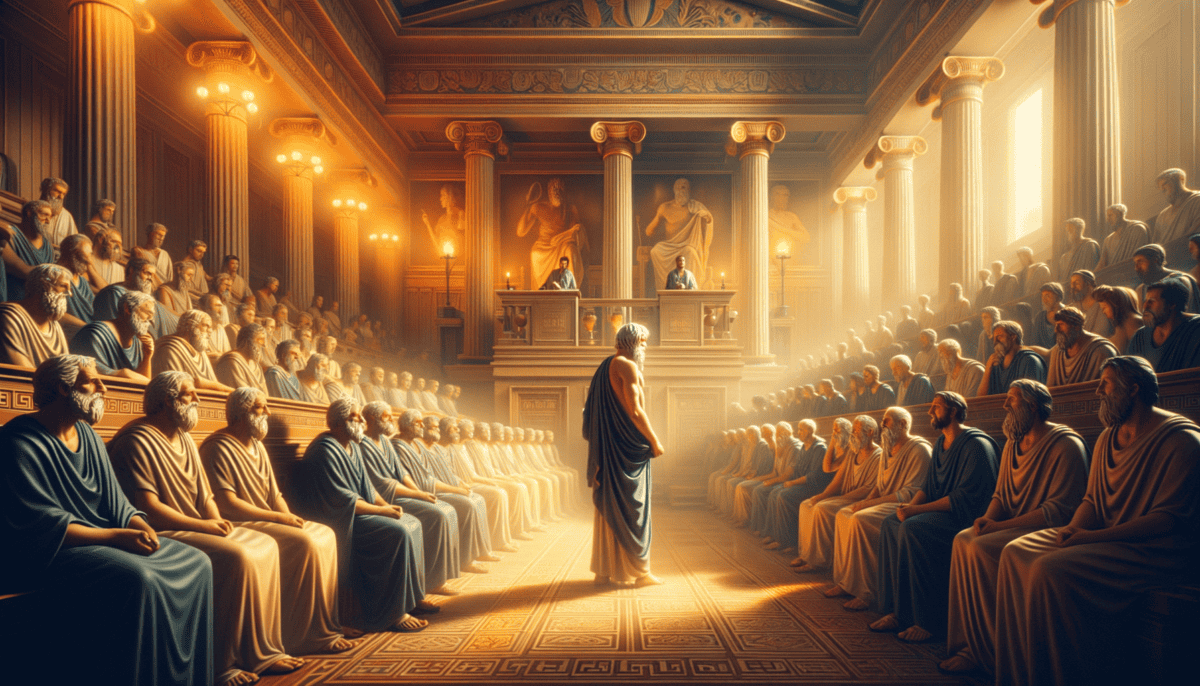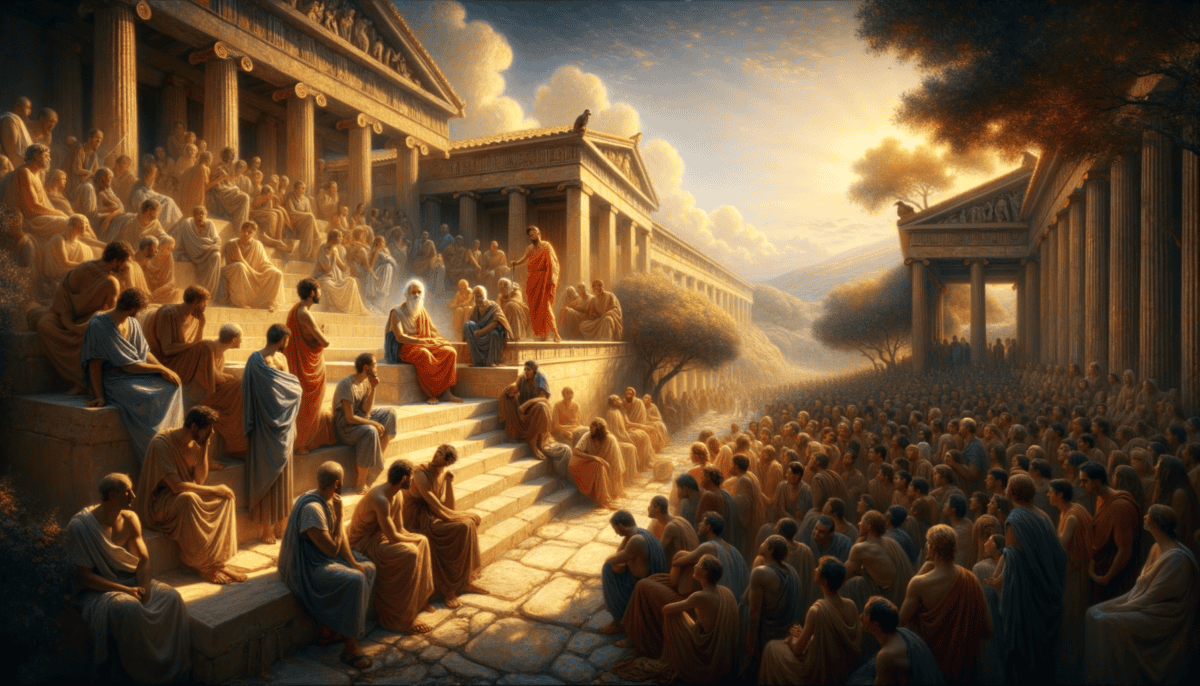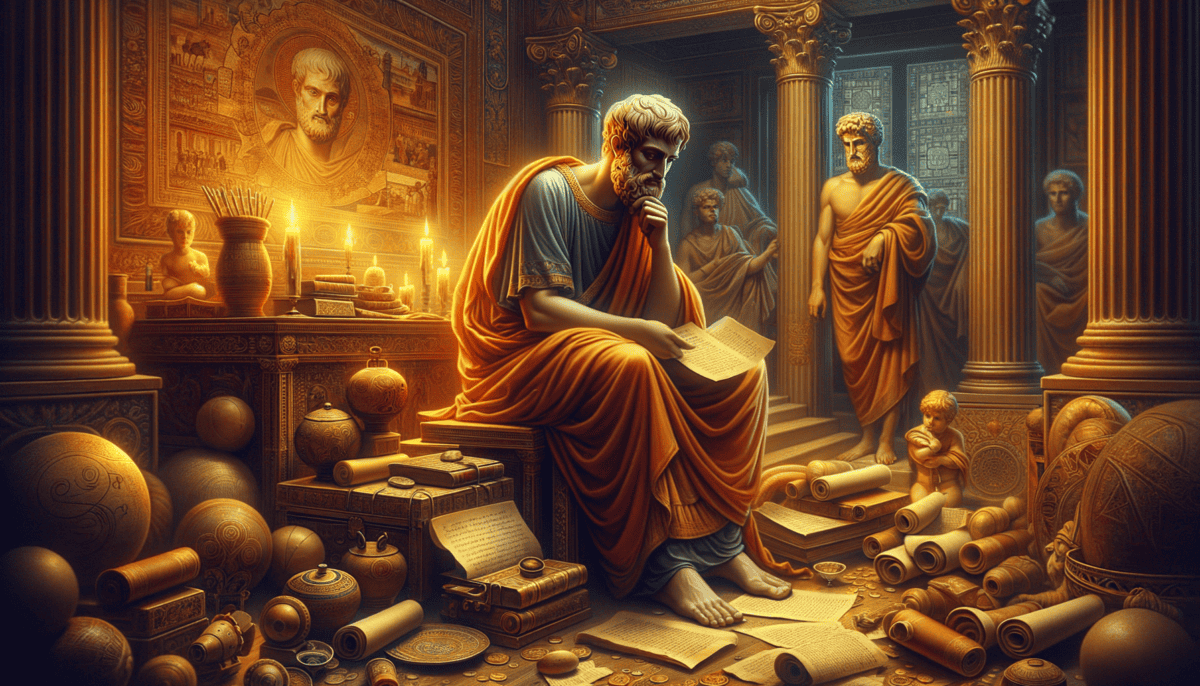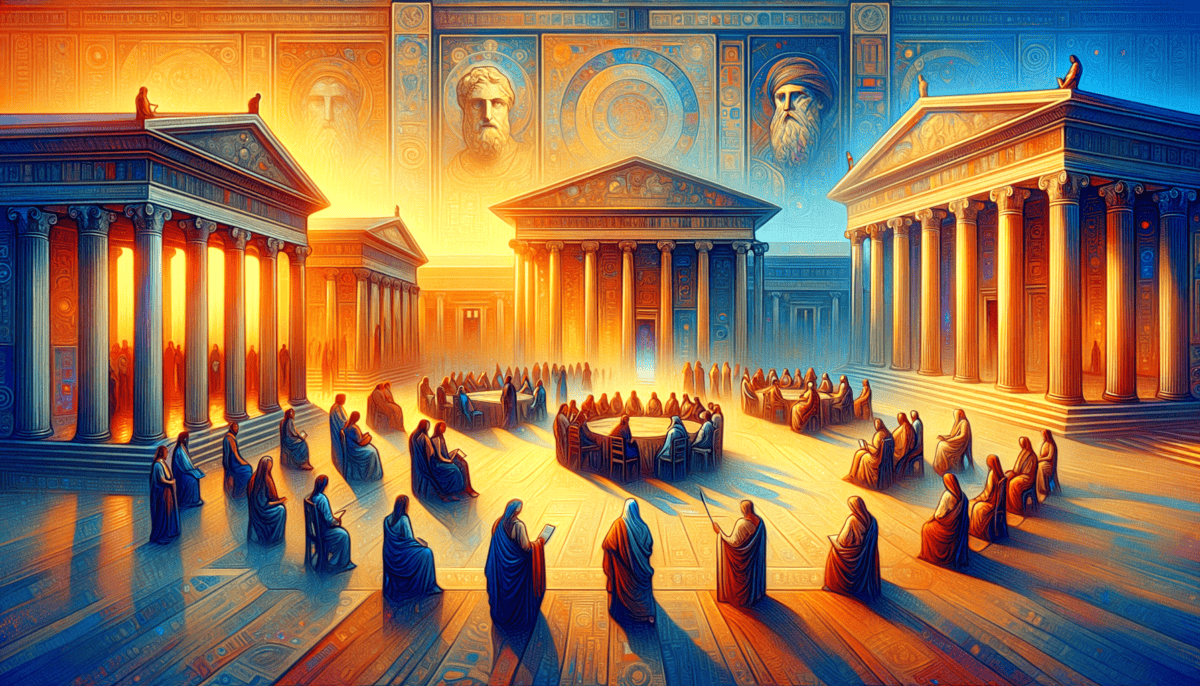The Curious Streets of Athens
The sun peeked over the marble buildings of Athens, casting long shadows across the busy marketplace. A young man named Socrates walked through the crowded streets. His eyes sparkled with curiosity as he watched the people around him.
"Good morning!" called out a friendly pottery seller. "Would you like to buy the finest vase in all of Athens?"
Socrates smiled and asked, "What makes it the finest vase? How do we know what makes something truly fine?"
The potter scratched his head. He had never thought about that before. This was how Socrates spent his days – asking questions that made people think in new ways.
All around Socrates, the city buzzed with life. Children played in the streets while their parents shopped at market stalls. Teachers called students to lessons under olive trees. The sweet smell of fresh bread mixed with salty sea air from the nearby port.
"Why do we do things the way we do?" Socrates would ask anyone who would listen. "How can we know what is right?"
Some people loved talking with Socrates. Others found his questions annoying. But everyone agreed he made them think about things differently.
A Special Kind of Teacher
Unlike other teachers who told students what to think, Socrates helped people find answers by asking questions. He believed everyone could learn by thinking carefully about things.
"Young man," called an old shoe maker, "why do you spend all day asking questions instead of doing real work?"
Socrates replied with a gentle smile, "But isn't thinking about life the most important work we can do?"
The shoe maker laughed and shook his head. But later that day, he found himself wondering about his own questions.
Making New Friends
As the day went on, Socrates met many people in the marketplace:
- A young student named Plato who loved to learn
- Market sellers who shared their wisdom
- Children who asked their own big questions
- City leaders who sometimes got angry at his ideas
Plato especially liked listening to Socrates talk. He wrote down many of their talks, which is how we know about them today!
The sun began to set over Athens, painting the white marble buildings orange and pink. Socrates headed home, happy with another day of learning and teaching through questions.
As stars began twinkling over the city, Socrates knew that tomorrow would bring new questions, new friends, and new chances to learn. The streets of Athens had many more secrets to share with those brave enough to ask about them.
Even when some people got mad at his questions, Socrates kept asking them. He knew that asking questions was how people learned to think better and be wiser. His curious walks through Athens would change how people thought forever.
Streets that were once just places to buy and sell things became spaces where big ideas could grow. Thanks to Socrates, Athens became known as a place where wisdom and learning were more valuable than gold.
Socrates and the Art of Conversation
The morning sun warmed the stone steps where Socrates sat with a group of eager listeners. Today, he wanted to teach them something special – how to find truth through talking. ️
“What is courage?” Socrates asked the group. A young soldier quickly raised his hand.
“That’s easy! Courage is fighting in battle,” the soldier said proudly.
“Is it?” Socrates smiled kindly. “Can someone be brave without fighting?”
Questions That Make You Think
A little girl in the crowd spoke up. “My mother is brave when she helps sick people, but she doesn’t fight.”
“Excellent observation!” Socrates beamed. “So courage must be more than just fighting, mustn’t it?”
This was how Socrates taught – not by telling people what to think, but by helping them think for themselves.
Not Everyone Likes Questions
Some powerful people in Athens didn’t like Socrates asking so many questions. They worried he was making young people doubt important rules.
“Why do you teach our children to question everything?” demanded an angry city leader.
Socrates replied calmly, “I only help them find the truth that’s already in their minds.”
Growing Trouble
More people came to hear Socrates every day. His students included:
- Young thinkers like Plato
- Children of important families
- Workers who wanted to learn
- People from far away places
But as his group of followers grew, so did his problems. Some leaders thought he was dangerous. They didn’t like how he made people question old ideas.
Teaching Through Stories
Socrates often used stories to help people understand big ideas. One day, he told about two boats:
“Imagine two boats,” he said. “One is fancy but doesn’t float well. The other is simple but sails perfectly. Which is better?”
“The one that sails well!” the children shouted.
“Just so,” Socrates nodded. “What looks good isn’t always what works best.”
Standing Strong
Even when people got angry, Socrates kept teaching. He believed asking questions was the best way to find truth.
“But Socrates,” worried his friend Crito, “what if they try to stop you?”
“Then I will still ask questions,” Socrates said firmly. “Because helping people think clearly is the most important thing I can do.”
As the sun set over Athens, Socrates watched his students walk home. He knew his way of teaching might get him in trouble. But he also knew that asking questions was worth any price. The seeds of wisdom he planted would grow for many years to come. ✨
A Day of Judgment
The great hall of justice in Athens was packed with people. Today was different from all other days. Socrates, the wise question-asker, stood before three judges. ⚖️
The Big Problem
“Socrates,” said the head judge in a loud voice, “you are here because people say you do bad things. They say you make young people not believe in our gods. They say you teach them to disobey.”
Socrates Speaks Up
Socrates stood tall, his white beard shining in the sunlight that came through the windows. He wasn’t scared.
“Dear judges,” he said calmly, “I only help people think. Is thinking bad? I ask questions to find truth. Is truth bad?”
A young student named Plato sat in the crowd, writing everything down. His eyes were sad but proud as he watched his teacher.
Friends Try to Help
“Let me speak for Socrates!” called out Crito, jumping up. “He has taught us so much good!”
“A teacher who makes us think is not an enemy. He is a gift to our city!” – Crito
The Hard Choice
The judges whispered together. Then they gave Socrates a choice:
“You can stop asking questions and teaching,” they said, “or you must leave Athens forever.”
Everyone held their breath. What would Socrates choose?
Standing for Truth
Socrates smiled his wise smile. “I cannot stop asking questions,” he said. “Questions are like air to me. They help us all grow wiser. If I must choose between stopping questions and leaving Athens, then I choose to leave.”
A Sad Decision
The judges looked angry. They hadn’t expected Socrates to be so brave. They talked again, and then made their final choice.
“Socrates,” they announced, “you must drink a special drink that will make you go to sleep forever.”
Gasps filled the room. Even some people who didn’t like Socrates thought this was too harsh.
The Last Lesson
In his final hours, Socrates gathered his friends around him. He wasn’t sad or scared.
“Don’t cry,” he told them. “Truth lives forever. Keep asking questions. Keep looking for wisdom.”
Young Plato promised himself he would never forget his teacher’s courage. He would keep asking questions and teaching others, just like Socrates had taught him.
As the sun set on Athens that day, something new was beginning. Socrates had shown that some things are worth more than staying safe. His questions would keep helping people think for many, many years to come. ⭐
Seeds of Wisdom
The sun rose over Athens, but the city felt different now. Plato walked through the quiet streets, his heart heavy. His teacher Socrates was gone, but his ideas lived on.
A New Beginning
Plato looked at the olive grove before him. This peaceful place would become something special – a school called the Academy. Here, people would learn to think and ask questions, just like Socrates taught.
Teaching Time
Students sat in circles under the olive trees. Plato walked among them, his white robe flowing in the breeze.
“Today,” Plato said, “we’ll talk about what makes things real.”
A young student raised her hand. “But teacher, how do we know what’s real?”
Plato smiled. This was his favorite kind of question.
The Cave Story
“Let me tell you a story,” Plato began. “Imagine some people living in a cave…”
“These people are tied up and can only see shadows on the wall. They think the shadows are real things. But what if someone got free and saw the real world outside?”
The students’ eyes grew wide. “Would they believe it?” asked one boy.
“That’s just like learning!” said another. “When we learn new things, we see the world differently!”
Big Ideas
Plato taught his students to think about perfect things. He called them “Forms.”
“Think about a circle,” he said, drawing in the dirt. “No circle we draw is perfect. But in our minds, we know what a perfect circle looks like.”
A Special Student
One day, a quiet boy named Aristotle joined the Academy. He listened carefully and asked clever questions. Plato knew this student was special.
“You remind me of myself when I was young,” Plato told him. “Always wanting to know why things are the way they are.”
Making Things Better
Plato didn’t just teach about thinking. He taught about making the world better.
“A good city,” he told his students, “is like a happy family. Everyone has a job to do, and everyone helps each other.”
He wrote these ideas in books called “The Republic” and “The Laws.” People still read them today!
Growing Wisdom
Years passed. The Academy grew bigger. Students came from many lands to learn. Some became teachers themselves.
As Plato watched his students learn and grow, he knew Socrates would be proud. The seeds of wisdom they planted were growing into a mighty forest of knowledge.
Young Aristotle sat under an olive tree, writing his own ideas. Soon, he would take these teachings and make them into something new…
The Mind of Aristotle
The olive trees swayed gently in the breeze as Aristotle walked through the Academy’s gardens. His teacher Plato’s words echoed in his mind, but new questions bubbled up.
A Different Way
“Look at this flower,” Aristotle said to his students, pointing to a bright red poppy. “What makes it real isn’t just the idea of a perfect flower. It’s right here, in front of us!”
The Young Teacher
Students gathered around as Aristotle showed them how to look closely at plants and animals. He wrote down everything he saw.
“Teacher, why do leaves fall in autumn?” a student asked.
“Let’s find out together,” Aristotle smiled. “We’ll watch the trees and write down what we see.”
A Special Student Arrives
One day, a boy with bright eyes arrived at the school. This was Alexander, son of King Philip of Macedon.
“I want to learn everything!” Alexander declared. “About the stars, animals, and how to be a good ruler.”
Aristotle taught Alexander about plants, animals, and how to think clearly. They spent many hours talking about what makes a good leader.
Learning About Everything
Aristotle was curious about everything! He made lists of what he learned:
-
• How animals live and grow
• Why stars move across the sky
• How people can be happy
• What makes some things fair or unfair
Ideas That Help People
Aristotle believed that being good meant finding the middle way between too much and too little.
“Being brave,” he told his students, “means not being too scared or too reckless.”
Alexander listened carefully to these lessons. He would remember them when he became a great king.
Sharing Knowledge
As Alexander grew up, he took Aristotle’s ideas to far-away lands. He built libraries and schools wherever he went.
A Growing World of Ideas
Aristotle started his own school called the Lyceum. Here, students learned by walking and talking together in the gardens. ♂️
He wrote many books about what he learned. These books helped people understand the world better for thousands of years!
As the sun set over Athens, Aristotle watched his students leave for the day. He smiled, knowing that their questions would lead to new discoveries. The world was full of mysteries waiting to be solved.
Meanwhile, far away, people in other lands were starting to hear about these amazing Greek thinkers…
Ideas That Changed the World
The sun rose over Alexandria, the great city Alexander built in Egypt. Inside its massive library, scrolls containing the wisdom of Socrates, Plato, and Aristotle lined the shelves.
A Meeting of Minds
People from many lands came to learn about Greek ideas. A young Roman named Marcus picked up a scroll about Socrates.
“These words make me think in new ways!” Marcus exclaimed. “We must share these ideas in Rome!”
Questions That Still Matter
The questions these wise Greeks asked still help us today!
-
• What makes something right or wrong?
• How can we know what’s true?
• What makes people happy?
• How should we treat each other?
Ideas in Action
“Look!” said a teacher in modern times. “When we vote in class, we’re using ideas from Athens. When we ask questions to learn, we’re being like Socrates!” ✋
Growing Wisdom
Today, people still study what Socrates, Plato, and Aristotle taught. Their ideas help us:
• Ask good questions
• Learn from nature
• Work together to find answers
The Journey Continues
In schools today, children raise their hands just like students did in ancient Athens. They ask “Why?” and “How do we know?”
Scientists use Aristotle’s careful way of looking at nature. Leaders think about Plato’s ideas about being fair. Lawyers use Socrates’ way of asking questions.
A Never-Ending Story
The story of these great thinkers didn’t end in ancient Greece. It lives in every classroom, every courtroom, and every place where people think deeply about life.
“The love of wisdom,” as philosophy means in Greek, continues to light up minds around the world. ✨
And so, just as the stars guided ancient sailors across the seas, these timeless ideas guide us as we explore life’s big questions together. The journey of learning that began on those dusty streets of Athens continues with every new question we ask.


